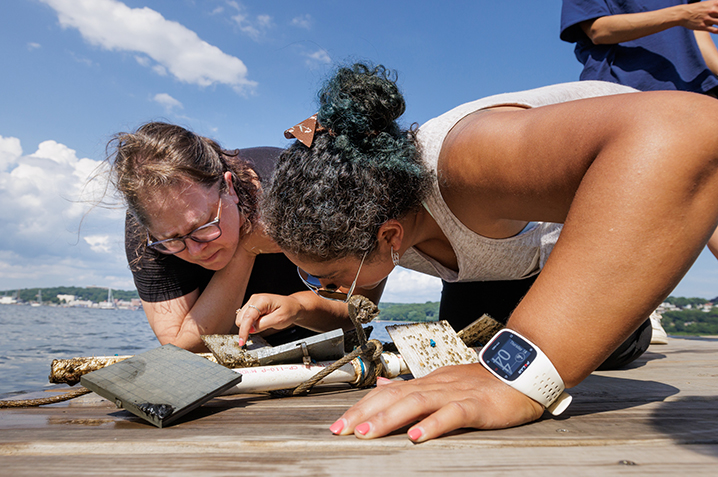Courtesy of Connecticut College
Professor Maria Rosa, the Carol & George Milne Assistant Professor of Biology, has been awarded two grants totaling $4.8 million for further study and restoration of Mamacoke Island, a designated area located within the Connecticut College Arboretum with salt marshes and coves that provides a crucial habitat for native wildlife. Located just north of Conn’s waterfront docks, Mamacoke Island was purchased by the College in 1955 for $15,000 from the Merritt-Chapman & Scott Corporation, a marine construction company. Since then, it has been a recreational and educational site, utilized by students in the Biology, Botany, and Environmental Studies Departments and by curious New Londoners appreciating its undisturbed natural beauty. Dr. Rosa’s research concerns her Mamacoke Island Aquatic Habitat Restoration Project, which centers on three parcels of land totaling 95.61 acres. The project’s focus is on restoring, rehabilitating, and preserving this essential wetland environment, whose coves provide a habitat for many duck species, particularly during the winter months when nearby lakes and rivers freeze.
In 2006, Mamacoke Island was designated as an Important Bird Area by the Audubon Society because of the great variety of bird species making their home on the island. The island’s avian species include Hooded Mergansers, Black Ducks, Canvasbacks, Bald Eagles, Pied-billed Grebes, American Coots, ospreys, and a variety of species of herons. Many of these birds depend on this area of land for their survival, particularly for food during the colder winter months. Though the Thames River does not freeze often due its brackish (a mix of river and sea that is slightly salty) water, when frozen, its layer of ice prevents ducks and other waterfowl from catching their prey. Mamacoke’s three coves and two salt ponds become an essential habitat for these animals. With this prestigious pair of grants, Dr. Rosa and her students plan to focus on high and low marshes, intertidal and subtidal shallows, stream restoration, and further study of plant and animal populations within Mamacoke Island’s expanse.
The first grant given to Professor Rosa is the Audubon Connecticut In Lieu Fee Grant Program, awarding $3.3 million to be distributed over several years. When milestones in progress are reached, additional funding will be allotted to the project. The second grant is the National Oceanic and Atmospheric Administration (NOAA) Transformational Habitats and Coastal Resilience Grants program, a program that focuses on providing government funding for projects that “will have a transformative impact for coastal communities and tribes across the country… [and] will help sustain our nation’s fisheries, make significant strides in the recovery of threatened and endangered species, and help protect coastal communities and ecosystems from the impacts of climate change”. Rosa’s acceptance of this funding, which is awarded by NOAA on a competitive basis every three years, will provide crucial monetary support for the Mamacoke Island Aquatic Habitat Restoration Project, allowing for assessments, data collection, project design, construction, and ongoing maintenance.
In an interview with the College, Dr. Rosa stated, “With conservation, we have an imperative to keep the site as close to natural as possible and natively source everything. We would build up the marsh sill, bring in the sediment and create an environment for the marsh to grow back. Once the habitat is restored, there is the possibility of a natural recruitment of mussels. They need that intertidal marsh to grow, and that’s all gone. The habitat must be restored before the biodiversity can return”.
Students in her lab classes have collected data on the marsh’s sedimentation levels, vegetation, and animal populations, painting a more complete picture of an ecosystem that is constantly changing. With these new funds, students’ further research will be supported for years to come.
Climate change’s effects have been observed as increased flooding in the habitat, an abnormality which could be a chance occurrence or a warning that future floods will increase in frequency.
“Before we can design a large-scale conservation effort, we need to make sure it’s not just an aberration. Maybe it’s just flooding; we had a lot of rainfall last year—or maybe we’re seeing an actual decline,” Dr. Rosa said to the College. Another warning sign is the loss of biodiversity– Dr. Rosa noted a complete recruitment failure (when a planned addition, via birth, maturation, or immigration, to a population fails) of marsh mussels and loss of animal and vegetation on the island. Dr. Rosa hopes that with research, a distinction can be made between “blips” in the environment’s radar and “new normals” and that using her grants, a future where Mamacoke Island continues to be a site of research and recreation for Conn students and the New London community will be ensured.










